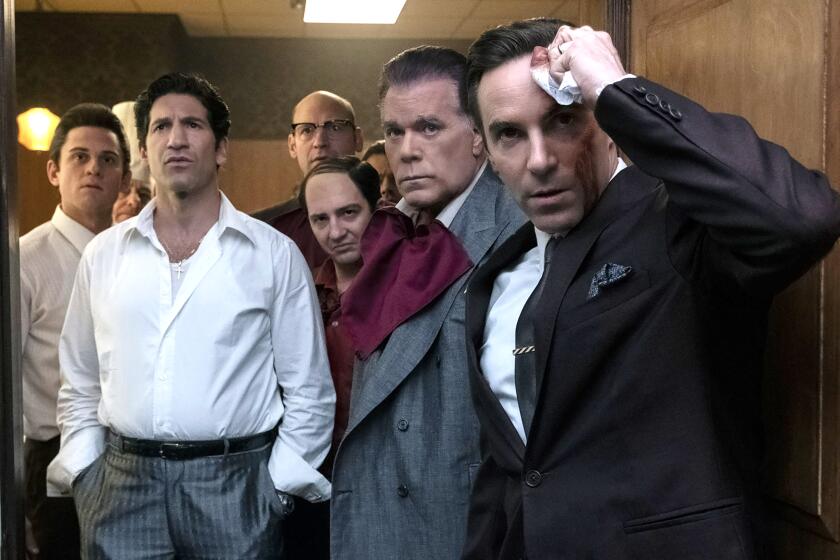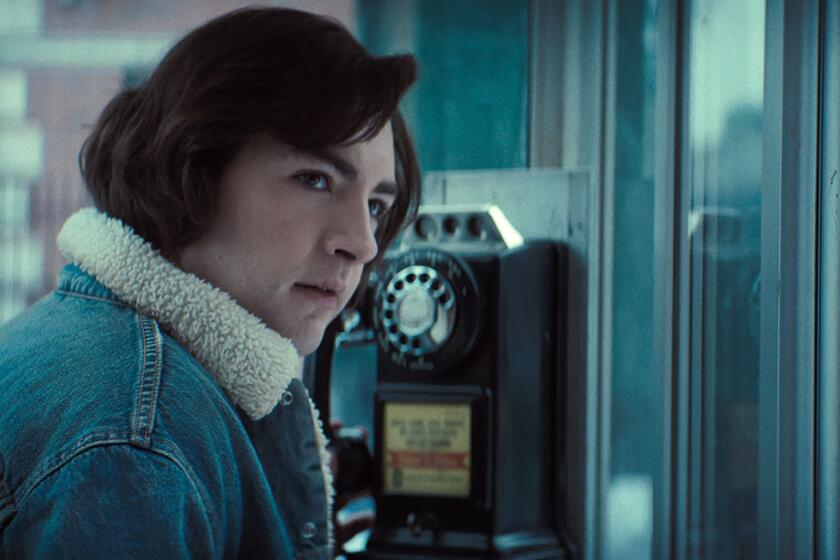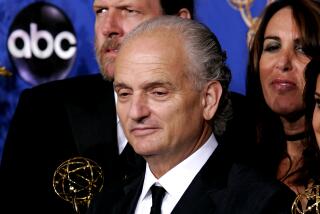How ‘Many Saints of Newark’ resolves the mysterious fate of a ‘Sopranos’ character
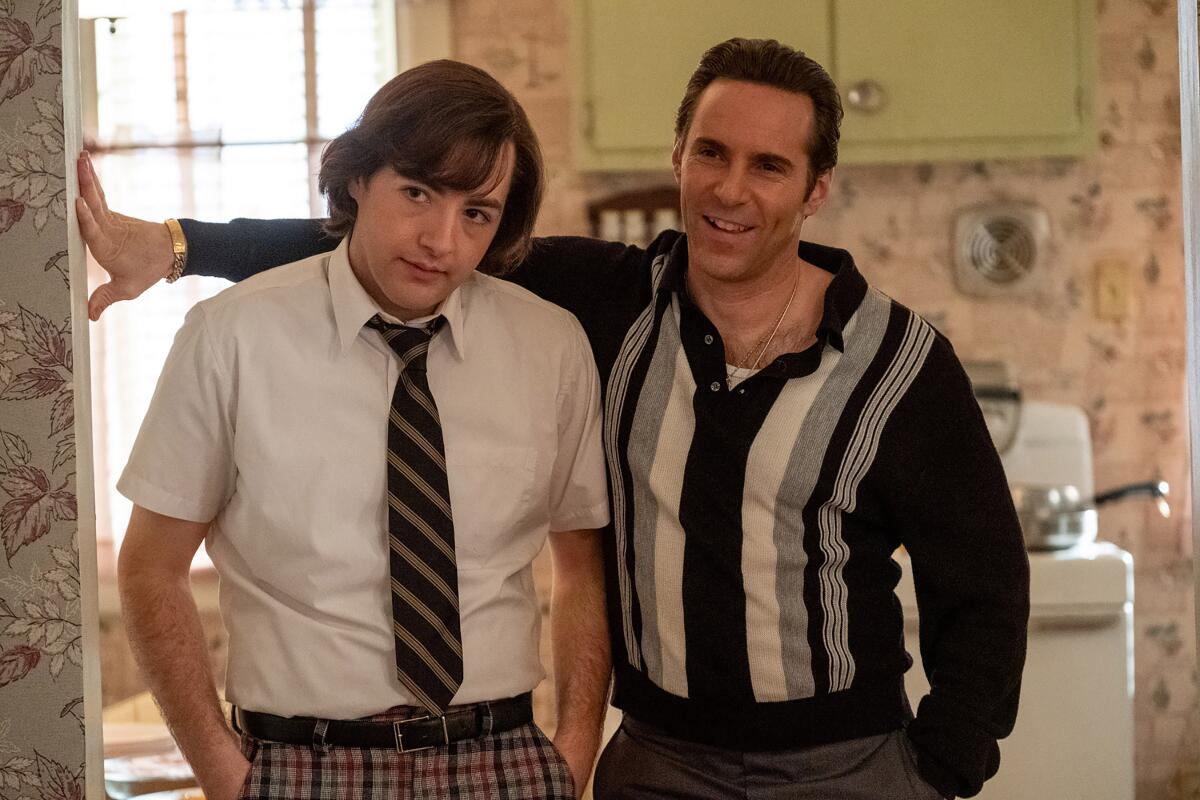
Warning: The following story contains major plot spoilers for “The Many Saints of Newark.” If you haven’t yet seen the film, we suggest reading the review and this feature on how the film reimagined the characters instead. And then come back when you’ve seen it.
Who killed Dickie Moltisanti — and why?
For years, the question has been debated by fans of the seminal HBO series “The Sopranos.” After thoroughly exploring every dark, violent nook and cranny of the world of mob boss Tony Soprano, even “Sopranos” creator David Chase didn’t know what actually led to the demise of Tony’s oft-mentioned mentor.
Now, in the much-anticipated new “Sopranos” prequel film “The Many Saints of Newark,” which debuts today in theaters and on HBO Max, we finally get an answer.
A Mafia soldier and the father of Michael Imperioli’s pivotal series regular — and Tony’s protégé — Christopher, Dickie Moltisanti was always a shadowy figure in “Sopranos” lore, spoken of as “legend” and a personal hero to Tony but never seen, aside for a single old photo in a Navy uniform.
Despite Dickie’s importance to Tony, until Chase decided to place the character at the heart of “The Many Saints of Newark” (with Alessandro Nivola cast in the role), little was known for certain about how he lived his life — or the exact manner of his death.
In the season four episode “For All Debts Public and Private,” Tony tells Christopher that Dickie was shot in cold blood outside his home in the 1970s as a result of a feud with a criminal named Jilly Ruffalo, who had killed Dickie’s cellmate while they were in prison. After Dickie gouged out his eye in retribution, Tony explains, Ruffalo contracted a corrupt cop named Barry Haydu to kill Dickie.
How David Chase recast old ‘Sopranos’ characters — and introduced new ones — for the big screen prequel ‘The Many Saints of Newark.’
When Christopher goes to exact his revenge on Haydu, though, the now-retired detective denies he had anything to do with Dickie’s death, claiming that Christopher is being set up. “Look, whoever told you I had anything to do with his death is lying,” he says, pleading for his life.
The last words the audience hears before Christopher kills Haydu are “I’m sorry,” but it is not entirely clear whether those words are coming from Haydu or from the television that’s playing an episode of “Magnum, P.I.” in the background.
“Sopranos” fans have long debated whether the story Tony told Christopher about Haydu was true or whether he was simply manipulating him to cement his allegiance while at the same time eliminating a corrupt cop who had outlived his usefulness. Some even speculated that perhaps Tony himself had somehow been involved in Dickie’s death and had used Haydu as a convenient fall guy.
The fact is, not even Chase knew for sure.
”I wrote the episode where Tony’s in the car explaining all this to Christopher,” Chase told The Times in August. “I just made it up. It was interesting to me to expand on it. Like, what the … is he talking about? In a way, the purpose of writing [the prequel film] was to find out what happened.”
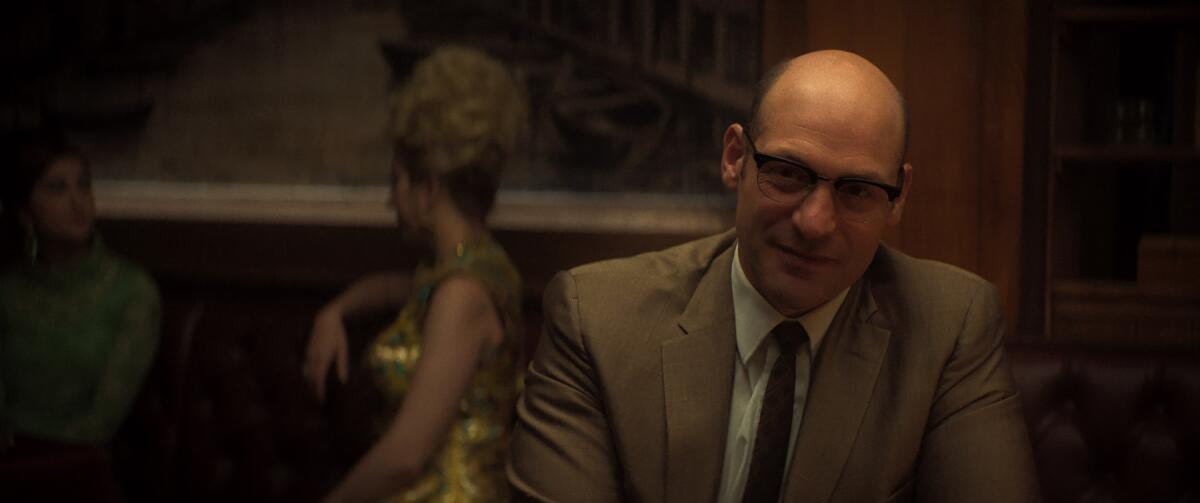
Well, now we know what happened — and it’s the film’s most shocking revelation.
Near the end of “The Many Saints of Newark,” we see Dickie shot twice in the back of the head by a faceless assassin while he’s removing TV trays from the trunk of his car outside his house. (Growing up, Christopher had been told it was a crib, but Tony did at least have that detail right.)
But the hit, it is revealed, was not contracted by Jilly Ruffalo — nor, as some watching the film might initially suspect, by Dickie’s former associate Harold McBrayer (played by Leslie Odom Jr.), who is trying to build his own criminal empire.
In fact, it was ordered by Tony’s uncle, Junior Soprano (Corey Stoll), whom we see after the hit receiving a phone call saying, “It’s done.”
“Sopranos” fans have long known that Uncle Junior (played by Dominic Chianese in the original series) is primarily fueled by grievance and jealousy. That perpetual feeling of being slighted is one of the main reasons the character was always among Chase’s favorites.
“All the writers loved writing for Junior,” Chase told The Times. “There was something that Dominic brought to him — the particular way he whined — that made it so wonderful.”
“The Many Saints of Newark” revisits HBO’s seminal TV drama “The Sopranos,” but the rich material would have been better off as a limited series.
In “The Many Saints of Newark,” we see Junior’s sense of resentment toward Dickie Moltisanti slowly build, even as he outwardly tells Dickie to consider him a brother. While the two occupy a similar level in the DiMeo crime family, it is clear that Junior is less respected than the younger, less experienced but more charismatic Dickie, a fact that gets under the power-hungry Junior’s already thin skin.
After Tony’s father, Johnny Soprano (Jon Bernthal), is released from prison, he castigates the ever-complaining Junior for not measuring up to Dickie. “Look at Dickie Moltisanti,” Johnny rails at his brother. “His father gets whacked, he steps up, takes care of his family, takes care of the business. Not a peep out of him.”
Later, Tony’s mother, Livia (Vera Farmiga), tells Junior that, even though he was supposed to look after Tony while Johnny was in prison, the only person Tony will listen to is his idol, Dickie, whom Tony calls his uncle though he is not, in reality, Dickie’s nephew.
For Junior, the final straw comes after he slips on a wet staircase and falls on his backside outside of a wake, and Dickie, while reaching out his hand to help him up, laughs in his face. At that moment, it seems Junior decides to bump off Dickie — a momentous move that both eliminates a rival and sets the Soprano family up for greater power.
Can the prequel film ‘The Many Saints of Newark’ kick off a new era in the ‘Sopranos’ saga?
In light of the film’s revelation, another question emerges: Did Tony know all along that Junior was actually the one who had Dickie whacked? Or did he think the story that he told Christopher about Jill Ruffalo was indeed the truth? (Whether the gunman was, in fact, Haydu is unclear in the film.)
It’s safe to assume that Junior would have kept his involvement in Dickie’s death a secret, allowing a false narrative to emerge. And had Tony known the truth, it’s unlikely he would have let Junior, with whom his relationship was always fraught, get away without some form of payback.
But it’s impossible to say for certain what Tony believed in his heart about the beloved mentor who had set him on the path toward a life in crime. Even after 86 hours of TV and a two-hour prequel film, there are still some mysteries about Tony Soprano that may never be solved.
More to Read
Only good movies
Get the Indie Focus newsletter, Mark Olsen's weekly guide to the world of cinema.
You may occasionally receive promotional content from the Los Angeles Times.
